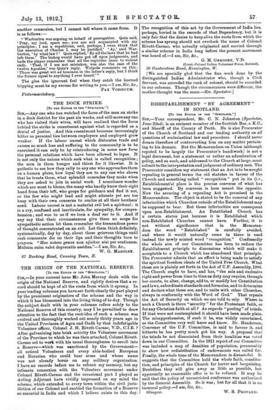DISESTABLISHMENT " BY AGREEMENT " IN SCOTLAND.
[To THR EDITOR Or TH1 "SPECTATOR."] SIR,—Your correspondent, Mr. C. N. Johnston (Spectator, June 22nd), is an eminent member of the Scottish Bar, a K.C., and Sheriff of the County of Perth. He is also Procurator of the Church of Scotland and our leading authority on all questions of ecclesiastical law and procedure. I should never dream therefore of controverting him on any matter pertain- ing to his domain. But the Memorandum on Union (although reputed to be largely the Procurator's handiwork) is not a legal document, but a statement or rather an adumbration of policy, and as such, and addressed to the Church at large, must submit to the interpretation and judgment of ordinary men. The Procurator considers my statement that an Act is to be sought repealing in general terms the old statutes in favour of the Church and something called " recognition" put in its (i.e., Establishment's) place is the precise converse of what has been suggested. By converse is here meant the opposite. Now the securing of a repealing Act is premised in the Memorandum. The object is stated to be the removal of any inferiorities which Churches outside of the Establishment may be supposed to bear. But those inferiorities are consequent upon non-Establishment. An Established Church has a certain status just because it is Established which non-Established Churches cannot have. Further, it is not without significance that in the Memoran- dum the word "Established" is carefully avoided, and where it would naturally come in there is used instead the newly minted word "recognition." Confessedly the whole aim of our Committee has been to reduce the Establishment principle to dimensions which will make it acceptable to a Church which has abandoned that principle. The Procurator admits that an effort is being made to satisfy the spiritual freedom ideals of the United Free Church. What these are is plainly set forth in the Act of U.F. Assembly, 1906. The Church ought to have, and has, " the sole and exclusive right and power from time to time as duty may require, through her courts, to alter, change, add to, or modify her Constitution and laws, subordinate standards and formulas, and to determine and declare what these are, and to unite with other Churches, always in conformity with the Word of God." That repeals the Act of Security on which we are told to rely. Where in such a Church is there "security" for the Protestant faith, or for any Christian faith at all ? As regards " pooling" of teinds. If that were not contemplated it should have been made plain. The misapprehension, if such it be, was widely entertained, as the Committee very well knew and know. Dr. Henderson, Convener of the U.F. Committee, is said to favour it, and hitherto he has pretty much got his way. A proposal that the teinds be not dissociated from their localities was voted down in our Committee. In the 1911 report of our Committee was included a map of densities of population, presumably to show how redistribution of endowments was called for. Finally, the whole tone of the Memorandum is distasteful. It suggests that the Committee hold the whole faith, constitu- tion, and principles of the Church for barter and bargaining. Doubtless they will give away as little as possible, but apparently no reasonable offer is to be refused. It may be said that the policy of unrestricted conference was authorized by the General Assembly. So it was ; but for all that it is an immoral policy.—I am, Sir, &c., Glasgow. W. S. PROVAND.






































 Previous page
Previous page